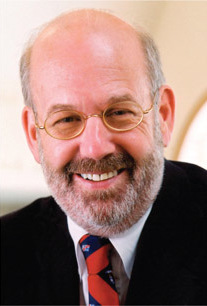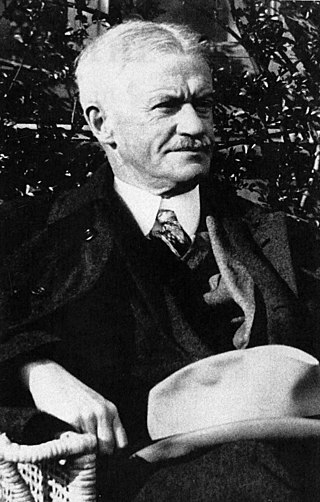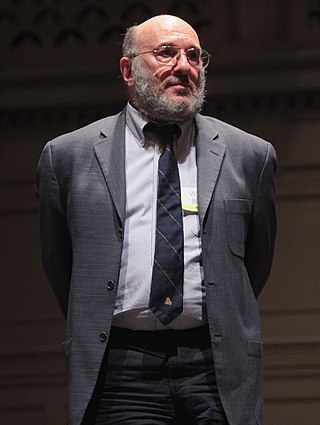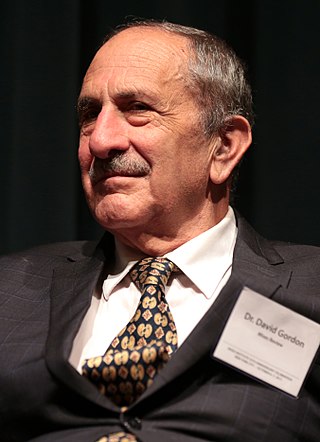
The Austrian school is a heterodox school of economic thought that advocates strict adherence to methodological individualism, the concept that social phenomena result primarily from the motivations and actions of individuals along with their self interest. Austrian-school theorists hold that economic theory should be exclusively derived from basic principles of human action.

Murray Newton Rothbard was an American economist of the Austrian School, economic historian, political theorist, and activist. Rothbard was a central figure in the 20th-century American libertarian movement, particularly its right-wing strands, and was a founder and leading theoretician of anarcho-capitalism. He wrote over twenty books on political theory, history, economics, and other subjects.

Hans-Hermann Hoppe is a German-American academic associated with Austrian School economics, anarcho-capitalism, right-wing libertarianism, and opposition to democracy. He is professor emeritus of economics at the University of Nevada, Las Vegas (UNLV), senior fellow of the Mises Institute think tank, and the founder and president of the Property and Freedom Society.

Llewellyn Harrison Rockwell Jr. is an American author, editor, and political consultant. A libertarian and a self-professed anarcho-capitalist, he founded and is the chairman of the Mises Institute, a non-profit promoting the Austrian School of economics.

Erik Maria Ritter von Kuehnelt-Leddihn was an Austrian-American nobleman and polymath, whose areas of interest included philosophy, history, political science, economics, linguistics, art and theology. He opposed the ideas of the French Revolution, as well as those of communism and Nazism. Describing himself as a "conservative arch-liberal" or "extreme liberal", Kuehnelt-Leddihn often argued that majority rule in democracies is a threat to individual liberties. He declared himself a monarchist and an enemy of all forms of totalitarianism, although he also supported what he defined as "non-democratic republics", such as Switzerland and the early United States. Kuehnelt-Leddihn cited the U.S. Founding Fathers, Tocqueville, Burckhardt, and Montalembert as the primary influences for his skepticism towards democracy.

Albert Jay Nock was an American libertarian author, editor first of The Freeman and then The Nation, educational theorist, Georgist, and social critic of the early and middle 20th century. He was an outspoken opponent of the New Deal, and served as a fundamental inspiration for the modern libertarian and conservative movements, cited as an influence by William F. Buckley Jr. He was one of the first Americans to self-identify as "libertarian". His best-known books are Memoirs of a Superfluous Man and Our Enemy, the State.
Statolatry is a term formed from the word "state" and a suffix derived from the Latin and Greek word latria, meaning "worship". It first appeared in Giovanni Gentile's Doctrine of Fascism, published in 1931 under Mussolini's name, and was also mentioned in Gramsci's Prison Notebooks (1971) sometime between 1931–1932, while he was imprisoned by Mussolini. The same year, the encyclical Non abbiamo bisogno by Pope Pius XI criticized Fascist Italy as developing "a pagan worship of the state" which it called "statolatry".

Thomas James DiLorenzo is an American author and former university economics professor who is the President of the Ludwig von Mises Institute. He has written books denouncing President Abraham Lincoln and is well known among economists for his work chronicling the history of antitrust policy in the United States.
Hans F. Sennholz was a German-born American Austrian School economist and prolific author who studied under Ludwig von Mises. A Luftwaffe pilot during World War II, he was shot down over North Africa on 31 August 1942, and spent the remainder of the war in a POW camp in the United States.

Mark Thornton is an American economist of the Austrian School. He has written on the topic of prohibition of drugs, the economics of the American Civil War, and the "Skyscraper Index". He is a Senior Fellow with the Ludwig von Mises Institute in Alabama and a Research Fellow with the Independent Institute.

Criticism of socialism is any critique of socialist economics and socialist models of organization and their feasibility, as well as the political and social implications of adopting such a system. Some critiques are not necessarily directed toward socialism as a system but rather toward the socialist movement, parties, or existing states. Some critics consider socialism to be a purely theoretical concept that should be criticized on theoretical grounds, such as in the economic calculation problem and the socialist calculation debate, while others hold that certain historical examples exist and that they can be criticized on practical grounds. Because there are many types of socialism, most critiques are focused on a specific type of socialism, that of the command economy and the experience of Soviet-type economies that may not apply to all forms of socialism as different models of socialism conflict with each other over questions of property ownership, economic coordination and how socialism is to be achieved. Critics of specific models of socialism might be advocates of a different type of socialism.

Ludwig Heinrich Edler von Mises was an Austrian-American economist, logician, sociologist and philosopher of economics of the Austrian school. Mises wrote and lectured extensively on the societal contributions of classical liberalism and the power of consumers. He is best known for his work in praxeology, particularly for studies comparing communism and capitalism, as well as for being a defender of classical liberalism in the face of rising illiberalism and authoritarianism throughout much of Europe during the 20th century.

For a New Liberty: The Libertarian Manifesto is a book by American economist and historian Murray Rothbard, in which the author promotes anarcho-capitalism. The work has been credited as an influence on modern libertarian thought and on part of the New Right.

The Panic of 1819: Reactions and Policies is a 1962 book by the economist Murray Rothbard, in which the author discusses what he calls the first great economic crisis of the United States. The book is based on his doctoral dissertation in economics at Columbia University during the mid-1950s.

Liberalism is a book by Austrian School economist and libertarian thinker Ludwig von Mises, containing economic analysis and indicting critique of socialism. It was first published in 1927 by Gustav Fischer Verlag in Jena and defending classical liberal ideology based on individual property rights. Starting from the principle of private property, Mises shows how the other classical liberal freedoms follow from property rights and argues that liberalism free of government intervention is required to promote peace, social harmony and the general welfare. The book was translated into English by a student of Mises, Ralph Raico, but its first English edition in 1962 was titled The Free and Prosperous Commonwealth rather than Liberalism, as Mises thought that the literal translation would create confusion because the term liberalism after the New Deal and especially in the 1960s became widely used in the United States to refer to a centre-left politics that supports degrees of government intervention, in opposition to Mises' central premise. The English translation was made available online by the Ludwig von Mises Institute in 2000.

"The Berlin Batman" is an Elseworlds tale published in The Batman Chronicles #11 in 1998 by DC Comics. It is written and illustrated by Paul Pope.

Walter Edward Block is an American Austrian School economist and anarcho-capitalist theorist. He was the Harold E. Wirth Eminent Scholar Endowed Chair in Economics at the School of Business at Loyola University New Orleans and a former senior fellow of the non-profit think-tank Ludwig von Mises Institute in Auburn, Alabama.

Floyd Arthur "Baldy" Harper was an American academic, economist and writer who was best known for founding the Institute for Humane Studies in 1961.

David Gordon is an American libertarian philosopher and intellectual historian influenced by Murray Rothbard's views of economics. He is a senior fellow of the Ludwig von Mises Institute, a libertarian think tank, and is the editor of The Mises Review.

Butler D. Shaffer was an American author, law professor and speaker, known for his numerous libertarian books and blog articles for LewRockwell.com. He was a professor of Law Emeritus at the Los Angeles-based Southwestern University School of Law.


















